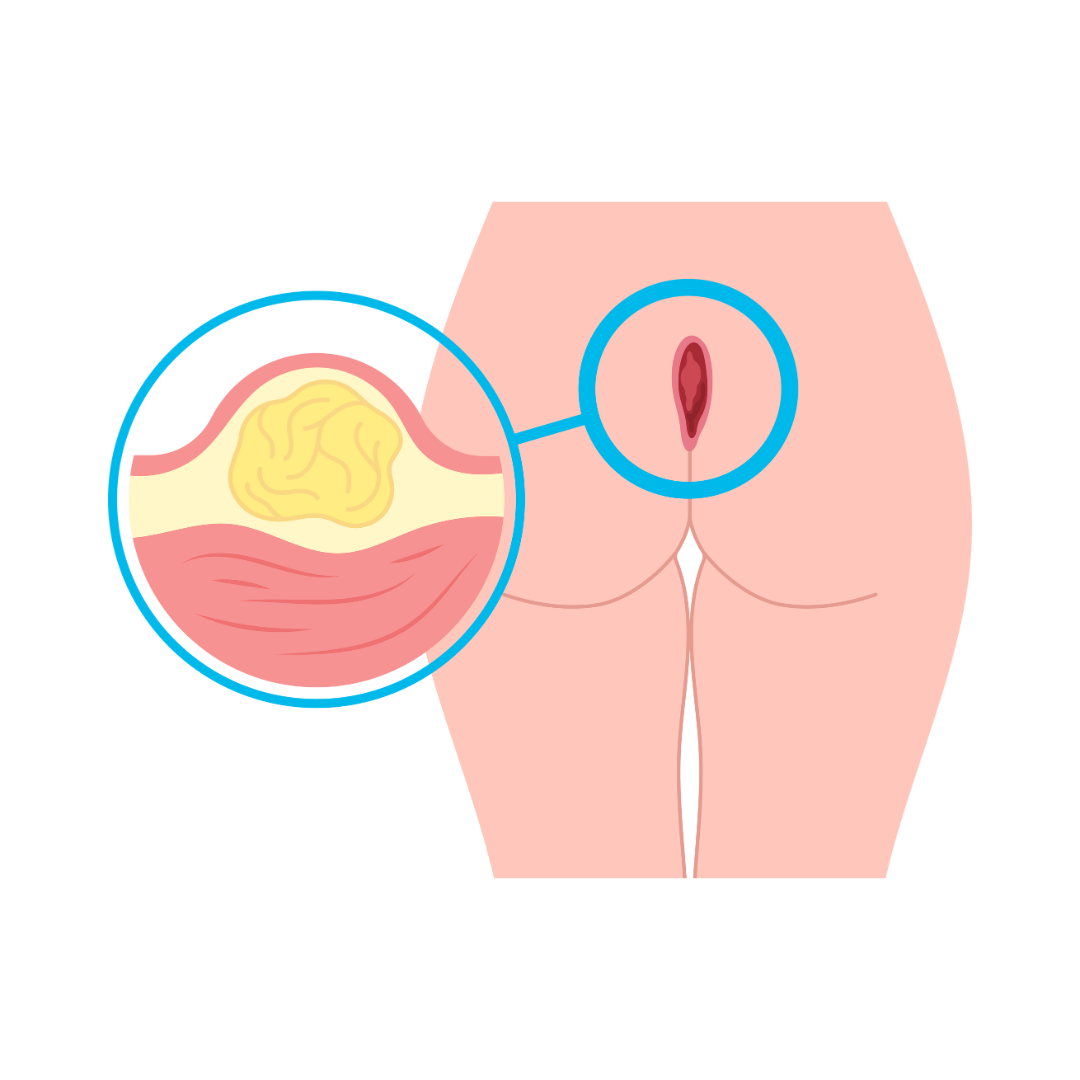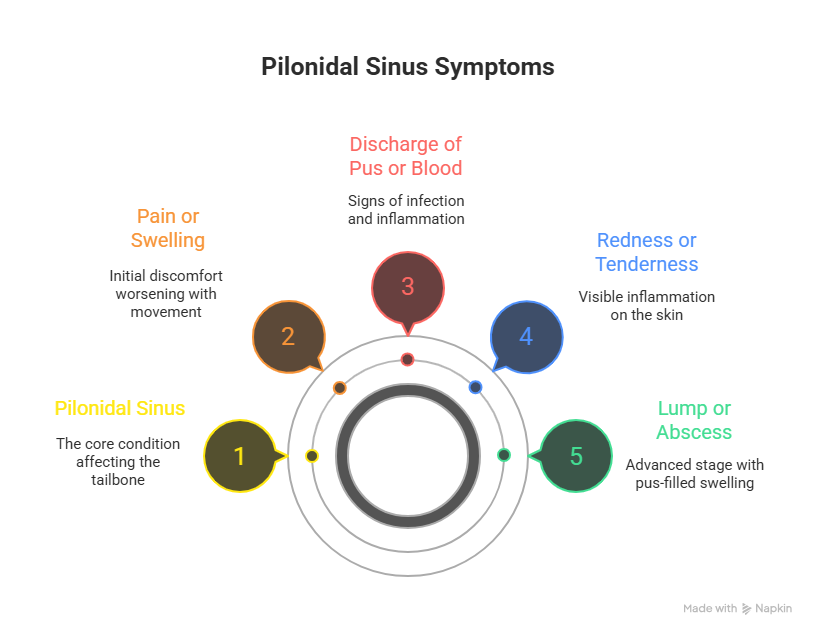Don’t Suffer in Silence
Get Relief from Piles in a Daycare!
Pilonidal Sinus Treatment in Bangalore

Pilonidal sinus is a painful infection that develops near the tailbone and often causes swelling, pus discharge, and difficulty sitting. If left untreated, it can become chronic and interfere with everyday life. At Hari Laser Clinics, we offer advanced and safe pilonidal sinus treatment in Bangalore using laser and endoscopic surgery.
Our goal is to provide faster healing, less pain, and minimal scarring through modern techniques performed by experienced surgeons.
What Is a Pilonidal Sinus?
A pilonidal sinus is a small tunnel or cyst under the skin near the tailbone. It develops when hair and debris become trapped beneath the surface, causing infection and pus formation.
If not treated early, it can lead to painful abscesses or repeated infections that require surgical removal. At Hari Laser Clinics, we treat all grades of pilonidal sinus using advanced laser procedures for long-term comfort and quick recovery.
Patients Often Ask:
Can pilonidal sinus heal without surgery?
In mild cases, symptoms may settle temporarily, but complete cure needs medical or surgical intervention.
Symptoms of Pilonidal Sinus
Identifying symptoms early ensures prompt and effective treatment before complications arise.
Pain or Swelling near the Tailbone – Pain worsens while sitting or bending and may feel deep under the skin.
Discharge of Pus or Blood – Signals infection; discharge may stain clothes and produce an odor.
Redness or Tenderness – The skin becomes warm and sore, showing active inflammation.
Recurring Infections – Indicates chronic sinus formation that needs laser treatment.
Formation of a Lump or Abscess – Painful swelling may burst, releasing pus and blood.
Timely care through laser pilonidal sinus treatment in Bangalore ensures quick recovery and prevents recurrence.

Stages or Grades of Pilonidal Sinus
Pilonidal sinus progresses gradually, and understanding its stages helps determine the right treatment approach.
Grade 1 (Simple Sinus) – Small opening without infection; mild discomfort.
Grade 2 (Infected Sinus) – Pus formation with redness, pain, and swelling.
Grade 3 (Recurrent Sinus) – Frequent flare-ups with multiple tracts.
Grade 4 (Complex Sinus) – Large sinus with abscesses requiring flap reconstruction.
Patients Often Ask:
What is the best time to get surgery for pilonidal sinus?
Surgery is best done once infection is under control – early laser procedures prevent larger abscesses and scarring.
Freedom from Your Pilonidal Sinus
Don’t Suffer Anymore!!

Book your Appointment!
Causes of Pilonidal Sinus
Understanding what triggers, the condition helps reduce recurrence after treatment.
Ingrown Hairs – Hair shafts pierce the skin and create infection-prone tunnels.
Friction and Pressure – Continuous sitting or tight clothing causes irritation near the tailbone.
Skin Trauma – Small cuts or injuries allow bacteria to enter and infect deeper tissues.
Sweat and Bacteria – Moisture buildup encourages bacterial growth, leading to abscesses.
Patients Often Ask:
Can poor hygiene alone cause pilonidal sinus?
Not directly, but poor hygiene worsens existing infection and delays healing.
Risk Factors for Pilonidal Sinus
Certain people are at higher risk due to lifestyle and body characteristics.
Age and Gender – Common in young men (15–35 years) with coarse body hair.
Obesity – Increases friction, sweating, and skin pressure.
Sedentary Lifestyle – Continuous sitting leads to blocked hair follicles.
Poor Hygiene – Sweat and hair accumulation increase infection risk.
Family History – Genetic tendency makes recurrence more likely.
Patients Often Ask:
Can exercise help prevent pilonidal sinus?
Yes. Staying active improves blood flow, reduces sweating, and helps maintain hygiene near the tailbone.
Pre-Care Instructions Before Laser Surgery
Proper preparation ensures safe and smooth laser surgery with faster recovery.
Fasting Before Surgery – Avoid food and water for 6-8 hours to allow safe anesthesia.
Inform About Medications – Mention blood thinners or diabetes medicines to your doctor.
Avoid Smoking and Alcohol – Both interfere with healing and anesthesia effectiveness.
Clean and Shave the Area – Reduces bacterial presence and keeps the surgical site sterile.
Arrange for an Escort Home – You may feel drowsy after anesthesia, so plan for assistance.
Advanced Treatment Options at Hari Laser Clinics
We provide customized pilonidal sinus treatment in Bangalore depending on infection severity and sinus depth.
Used for early or mild cases. Includes antibiotics, hygiene maintenance, and laser hair removal. These offer temporary relief but cannot cure the sinus permanently.
Our most recommended treatment. A laser fiber is inserted into the sinus tract to remove infection and seal it from inside.
Procedure Highlights: performed under local or short general anesthesia, takes 30–45 minutes, same-day discharge with minimal pain.
Benefits: less bleeding, faster recovery, tiny incisions, and low recurrence rate.
For deep or recurring sinuses, endoscopic cleaning or flap closure is performed to reshape the area and prevent reinfection. Though recovery takes longer, results are permanent.
Benefits of Laser Pilonidal Sinus Treatment
Laser surgery combines safety, precision, and comfort.
Minimal Pain and Bleeding – Laser seals vessels instantly, reducing swelling.
Fast Healing – Wounds close within days; patients walk the same day.
Low Recurrence – Laser energy seals the sinus completely, preventing new tracts.
Day-Care Procedure – Discharge within hours; no long hospital stay.
Cosmetic Advantage – Heals without visible scars.
Patients Often Ask:
Is laser treatment permanent?
Yes. Once the sinus tract is sealed completely, recurrence is extremely rare.
Post-Care After Pilonidal Sinus Laser Surgery
Recovery care ensures permanent healing and lowers recurrence risk.
Keep the Area Clean and Dry – Prevents bacterial growth during healing.
Avoid Prolonged Sitting – Reduces friction on the operated site.
Take Medicines on Time – Antibiotics and painkillers aid quick healing.
Eat a Balanced Diet – Fruits and fluids help tissue repair.
Attend Follow-Up Visits – Allows your doctor to monitor recovery and prevent recurrence.
Recovery Timeline
| Day / Week | Progress |
|---|---|
| Day 0 | Laser procedure completed; discharged within 6 hours. |
| Days 1–2 | Mild soreness; walking comfortably. |
| Days 3–5 | Return to work; wound nearly healed. |
| Week 2 | Full recovery and normal skin appearance. |
About the Author - Dr. Varun Kumar J

MBBS, DNB (General Surgery), FIAGES, FMAS
Dr. Varun Kumar J,
MBBS, DNB (General Surgery), FIAGES, FMAS
General & Laparoscopic Surgeon | Laser & Varicose Vein Specialist
Dr. Varun Kumar J is an experienced Laparoscopic and Laser Surgeon in Bangalore with over 14 years of expertise in minimally invasive surgery. He specializes in piles, fissure, fistula, varicose veins, and hernia treatments using advanced laser techniques.
Known for his compassionate care and precision, Dr. Varun ensures every procedure is safe, simple, and stress-free for his patients.
Experience: 14+ Years
Hospitals: Medfine Hospital & Hari Laser Clinics, Bangalore.
Why Choose us for Pilonidal Sinus Treatment?
Advanced Laser Techniques
We use USFDA-approved laser treatments for painless and scar-free piles removal. These minimally invasive techniques ensure faster recovery and reduced pain compared to traditional methods.
Expert Care by Dr. Varun Kumar J
Dr. Varun Kumar J ensures each treatment is personalized for the patient’s needs, providing comprehensive care for long-term relief.
Quick Recovery
Most patients can resume normal activities within 24 hours due to our non-invasive procedures and fast healing.
Post-Surgery Support
Our dedicated team offers post-treatment guidance, including follow-ups and recovery tips to promote optimal healing.
Commonly Asked Questions
Is laser surgery good for pilonidal sinus?
Yes, it’s safe, precise, and long-lasting.
How long is recovery?
Usually 3–5 days.
Can it return after laser treatment?
Rarely, if hygiene is maintained.
Do I need hospitalization?
No, it’s a same-day procedure.
What anesthesia is used?
Local or short general anesthesia.
